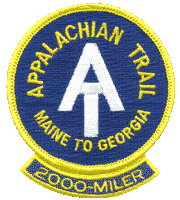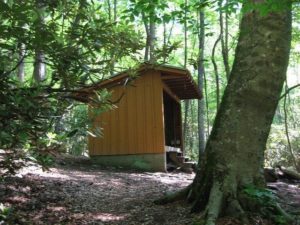Ted Malone is being honored for having been an Appalachian Trail maintainer for more than 25 years. He was the club’s Hiker of the Year in 1990, and with the Stan Murray awardee in 1993. A review of the club’s records shows that the AT maintenance hours and number of volunteers increased significantly in the mid 1990’s due to his leadership as maintenance recruiter. The records also show that he has over 1,100 hours as a volunteer on the AT. We will honor Ted with a plaque to celebrate his 25 years at the next dinner meeting.
Dale Douthat “Navigator” is TEHCC’s latest 2000-Miler

Dale reports that he completed the Appalachian Trail on 9/10/2019 in Gorham, NC. More stories to be shared once he returns to Tennessee.
Overmountain Shelter closed until further notice due to structural concerns
US Forest Service announced (News Release) that for public safety, the Overmountain Shelter (aka Yellow Mountain barn) has been closed pending further evaluation of options for the structure and site management. Tent camping in the area is still allowed (and the privy remains open!).
No timeline has been set for the review and decision. The situation with the barn has been discussed and monitored for several years. Damage observed for a key support beam triggered the closure action.
TEHCC New Members – August 2019
| Arden Pletzer | Benjamin Pruett | Kristin Smith |
| James Saucier | Sarah Coulson | Kelsey Bailey |
| Jacob Reynolds | Lexi Kloeppel | Ian Kilcoyne |
| Tami Gentry | David Gyles | Terry Shaw |
Injury due to Lightning Strike on Roan Mountain

NC Appalachian Ranger District shared an injury report from mid-July with the club to bring attention to this severe weather hazard. Two couples, one with a small baby, walking across the open balds on the Appalachian Trail across the Roan Highlands were indirectly hit by lightning. The bolt was described as a fireball coming towards them through the water flooding the trail path during a heavy thundershower. The young mother apparently got the brunt of the lightning jolt which catapulted her two to four feet into air. The lightning strike numbed their feet temporarily with blood circulation gradually returning to their extremities. While all victims were able to subsequently walk, the mother also exhibited some signs of shock. The group was led back to the Carvers Gap parking lot but was scared by any further thunder in the distance.
The weather that day was scattered thundershowers. The group had hiked out onto the open balds during sunshine, but a passing front quickly changed the situation. Awareness of any forecast for thunderstorms should change your plans especially for trails in the elevated areas common in our region. If thunder is heard, immediately seek safe shelter which is likely your vehicle back at the trailhead, even if your weather is currently good since lightning can strike many miles away from the storm. Stay sheltered for at least 30 minutes after you heard the last clap of thunder. If unable to safely reach your vehicle, seek lower elevation away from tall and/or isolated trees. Being alert regarding the weather to take appropriate actions is the best safety approach.
Note: The August 17th hike on A.T. from Tanyard Gap to Rich Mountain Firetower was rescheduled from original June date due to prediction of thunderstorms. Who wants to be in a metal box raised high above a ridgeline in a lightning storm?
TEHCC New Members – June 2019
Please welcome the following new members for June 2019
| Annemarie Schaefer | Bryce Curtsinger | Seth Willis |
| John Ford | Ed Cwirko | Dennis Rochette |
Thank you donation for impressive trail maintenance!
TEHCC received a $250 gift in memory of Mary Ellen Abrecht and Sue King who were part of 15 friends that have slackpacked sections of the Appalachian Trail every May over the past 13 years. The group is mostly from the DC area with others coming in from California, Kentucky, and Minnesota. They stayed at a motel in Johnson City, while sampling as many local eateries at night. The crew jokingly call themselves the “2070 AT Hikers” since when they would finish at their current pace.
The donation was made in honor of two members sadly lost during the past year. Group was impressed by the five-star condition of the trail along the NC/TN border, so researched who was the local trail club – TEHCC. Thank you to the many volunteers who put in the hours to create an enjoyable experience for those who wander through our section.
Goodbye, Watauga Lake Shelter
Built in 1980 by the US Forest Service, the basic three-sided shelter was designed for six people and located 50 yards off the Appalachian Trail south of TVA Watauga Dam not far from the lake. The original shingled roof was replaced with metal in 1997. The shelter was further maintained in 2007 by staining the outside and installing a gutter on back. A BSA Eagle project in 2011 by Seth Douthat provided a bear pole for food protection.

In 2013, activity by multiple families of bears, and not just a couple of bears, at the TVA campgrounds (Watauga Dam and Little Wilbur) and along the A.T. around Watauga Lake led to the US Forest Service issuing a facility closure notice for the Watauga Lake Shelter. Instructions were to not stop between US321 to Wilbur Dam Road to eat, rest, or camp overnight to reduce any potential encounters. TVA successfully implemented strategies to reduce access to food/ waste in the campgrounds with elimination of tent camping, banning (with fines) outside storage of food, improved trash containers, and education signs. Options for the shelter area were extensively discussed between the partner organizations.
The temporary closure notice for the shelter was lifted in Spring 2016, and unfortunately, bear encounters immediately resumed. A bear destroyed two tents at the shelter, was scared off, then returned to climb the food pole. A bear appeared the next night to destroy another tent holding equipment and supplies while hikers slept in the full shelter and another nearby tent. The bear then came back to successfully acquire food bags hanging from trees. The ranger district immediately imposed the bear closure again “Until Further Notice”.
Situation with bears at Watauga Lake Shelter was further discussed during 2016-2018 to conclude it was not going to be improved with available administrative and physical controls. The shelter itself was deemed not suitable for relocation, thus decision made by the partner organizations to take down the building. In March 2019, the bear pole, steps, and table were removed to discourage use. Finally, the shelter was disassembled in May with the metal parts and shingles hauled back across the lake by TVA boats (many thanks for the assistance!) for disposal while the wood components were burned in place. The closure notice for camping between US321 and Wilbur Dam Road remains in force.
While Watauga Lake Shelter provided nearly forty years of service, it is a disappointment that the recreational use on and along the lake could not sufficiently practice Leave No Trace principles to avoid creating an attractive enticement for the bears.
Bear Activity near McQueen Knob – May 2019
ATC has received multiple reports in early to mid-May of bears taking food in the trail section around McQueen Knob – from south at the old farmstead to the emergency shelter. This same stretch of trail had bear activity in 2018.
Several campsites were visited by a bear that was circling around until able to grab insufficiently hung bags or broke the low branch to gain access to the food. Sometimes the hanging bags were just torn in place to drop the contents.
Please take necessary precautions to limit risk of encountering a bear, Hikers should camp 200 feet away from where their food and “smellables” are stored for their own safety. For most adults, 200 feet is about 80 steps. Bear canisters should be sealed correctly and not stored in shelters. (Certified list) Proper use for Ursacks are to tie securely to the trunk of a tree. (Link to their How to Use page) Hanging bear bags should employ a very high branch away from your campsite. (Instructions – practice at home first!)

